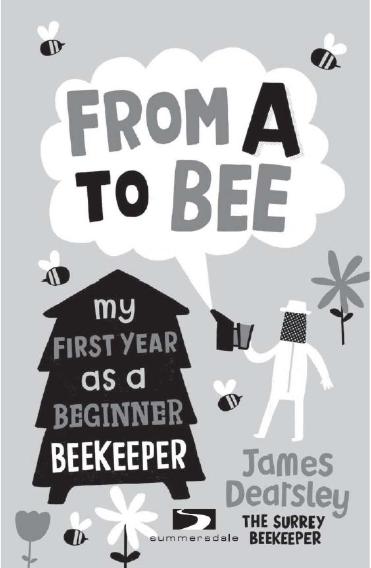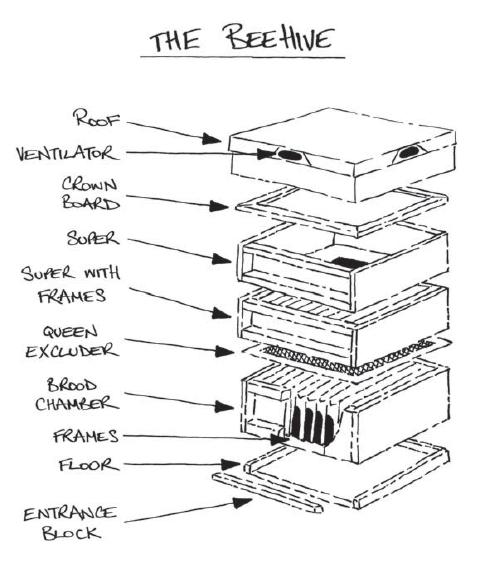From A to Bee
Authors: James Dearsley


FROM A TO BEE
Copyright © James Dearsley, 2012
All rights reserved.
No part of this book may be reproduced by any means, nor transmitted, nor translated into a machine language, without the written permission of the publishers.
The right of James Dearsley to be identified as the author of this work has been asserted in accordance with sections 77 and 78 of the Copyright, Designs and Patents Act 1988.
Condition of Sale
This book is sold subject to the condition that it shall not, by way of trade or otherwise, be lent, re-sold, hired out or otherwise circulated in any form of binding or cover other than that in which it is published and without a similar condition including this condition being imposed on the subsequent publisher.
Summersdale Publishers Ltd
46 West Street
Chichester
West Sussex
PO19 1RP
UK
46 West Street
Chichester
West Sussex
PO19 1RP
UK
eISBN: 978-0-85765-721-3
Substantial discounts on bulk quantities of Summersdale books are available to corporations, professional associations and other organisations. For details telephone Summersdale Publishers on (+44-1243-771107), fax (+44-1243 786300) or email (
[email protected]
)
[email protected]
)


ACKNOWLEDGEMENTS
This book is dedicated to Mum and Dad for their unwavering support over the years and to my sister Emma, to my lovely Belle-Mère and also to Peter who is sorely missed but never far from our thoughts. However, my darling Jo deserves all the credit for putting up with my crazy plans and ideas â for which I am eternally grateful. I am proud to be her husband each and every day. Finally, this book is dedicated to my beautiful boys, Sebastian and Edward, with whom I look forward to a lifetime of adventures and mischief.
I ran a social media competition to name the title of this book and so I must personally thank everyone that suggested a title. The winner,
From A to Bee
, was suggested by Henrik Cullen, but I also have to extend my thanks to my good friend Rob Hoye, who was beaten into second place by a mere seven votes. Another good friend, George TC, came joint third with Liz Bennett. It was great fun and thank you to all that took part and thank you to Summersdale, who allowed me to run this rather madcap campaign and have been supportive throughout and a joy to work with.
From A to Bee
, was suggested by Henrik Cullen, but I also have to extend my thanks to my good friend Rob Hoye, who was beaten into second place by a mere seven votes. Another good friend, George TC, came joint third with Liz Bennett. It was great fun and thank you to all that took part and thank you to Summersdale, who allowed me to run this rather madcap campaign and have been supportive throughout and a joy to work with.

ABOUT THE AUTHOR

James Dearsley
, the Surrey Beekeeper, started The Beginner Beekeepers page on Facebook, one of the largest online communities of beekeepers, and is on Twitter (@surreybeekeeper). His site
www.surreybeekeeper.co.uk
started as a blog, so others could learn from his mistakes, and expanded into a shop and general online resource for beekeepers. He has written for a variety of publications around the world including
The Ecologist
and has recorded a DVD,
Beekeeping for
Beginners
, with Charlie Dimmock, which is now on general release. He lives with his wife and two sons in Surrey.
, the Surrey Beekeeper, started The Beginner Beekeepers page on Facebook, one of the largest online communities of beekeepers, and is on Twitter (@surreybeekeeper). His site
www.surreybeekeeper.co.uk
started as a blog, so others could learn from his mistakes, and expanded into a shop and general online resource for beekeepers. He has written for a variety of publications around the world including
The Ecologist
and has recorded a DVD,
Beekeeping for
Beginners
, with Charlie Dimmock, which is now on general release. He lives with his wife and two sons in Surrey.

CONTENTS
Diagram of a Beehive
Introduction
Diary
Resources
Introduction
Diary
Resources

INTRODUCTION
Beekeeping⦠Oh my, what have I done?
  I am thirty years old, have been married for three years and am a new father to a fantastic little boy. Surely there are things that I should be doing at this age which do not involve little yellow and black insects that can hurt you if you are remotely clumsy â which, at 6 foot 5 inches, I have an amazing ability to be. My wife, Jo, thinks I have lost my mind, and my little boy looks at me rather strangely when I start running around the living room making buzzing noises and flapping my arms frantically as I try desperately to make him laugh. I think maybe my wife is right. My mother has somewhat disowned me and blames my father for my eccentric ideas â he is, after all, a morris dancer. My colleagues think I have simply lost the plot; they take a wide berth around my desk and no longer engage in conversation, knowing that it will end up with me talking about bees.
  It is no surprise, therefore, that I should reflect on precisely what it is that I am about to undertake. Especially when, a) I have spent my whole life running away from what I have always felt to be frightening insects, and, b) I don't particularly like honey. And yet regardless of these two small issues, I have started to learn the simple â or so I thought â art of beekeeping.
  My decision to become a beekeeper started in the middle of the year on one of those fantastic summer evenings when the light is beautiful, resting on the garden, and I was there, glass of wine in hand, watering the flower beds. It was one of those moments to treasure until I realised I had completely drenched a poor bumblebee trying to seek shelter in the flower of a gladioli. The poor little thing did not look too happy but just bumbled along onto the next flower. I was transfixed, and sometimes it takes just a moment for me to become obsessed. This was a glorious creature just going about its duty when a great beast of a thing (me!) came along to interrupt its vital role in the great world we live in.
  That moment got me thinking about the whole bee world and it was then that I started reading about the plight of the honeybee. I hadn't even considered that there was more than one type of bee (I now know there are over 200 different types of bee in the UK alone). It sounded as if they were having a hard time â and I mean a seriously hard time â and not just from the likes of ambitious and competitive gardeners watering their plants. Honeybee populations are dropping in considerable numbers due to a multitude of factors which have collectively been termed 'colony collapse disorder' and not a lot was being done, it appeared.
  There were also other reasons why bees were starting to appeal. I was becoming increasingly fascinated by elements of the self-sufficient lifestyle and I love growing vegetables on the allotment. The old romantic in me had idealistic notions of taking my little boy up to the allotment, and each Saturday going to check the bees with him just to teach him about the world and where everything that ends up on his plate comes from.
  In order to turn my idealistic thoughts into reality I had to start to learn the art of the beekeeper, if only to help the bees in my area. Maybe I could make a difference and cause a butterfly effect in the UK which would spread throughout the world and save the humble beeâ¦
Other books
Tegan's Power (The Ultimate Power Series #4) by Cosway, L.H.
The Great A&P and the Struggle for Small Business in America by Marc Levinson
Corner of the Housetop: Buried Secrets by Leen Elle
Millom in the Dock by Frankie Lassut
Sucker Bet by Erin McCarthy
Touch of the Demon by Diana Rowland
Saved By The Doctor (BWWM Romance) by Tasha Jones, BWWM Crew
The Bachelor's Brighton Valley Bride (Return to Brighton Valley) by Judy Duarte - The Bachelor's Brighton Valley Bride (Return to Brighton Valley)
Phi Beta Murder by C.S. Challinor
(Club Chrome MC 2) All Dogs Bite by Alexx Andria
